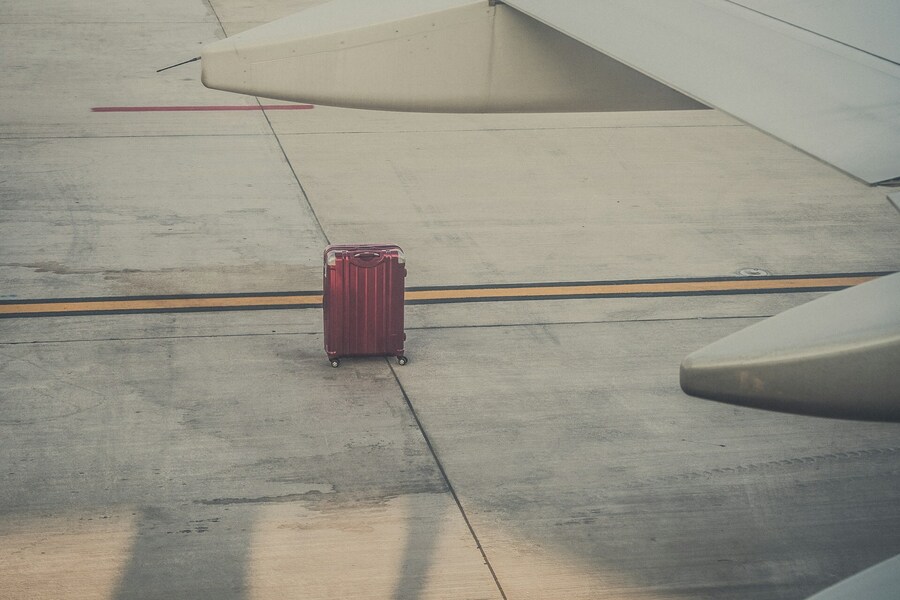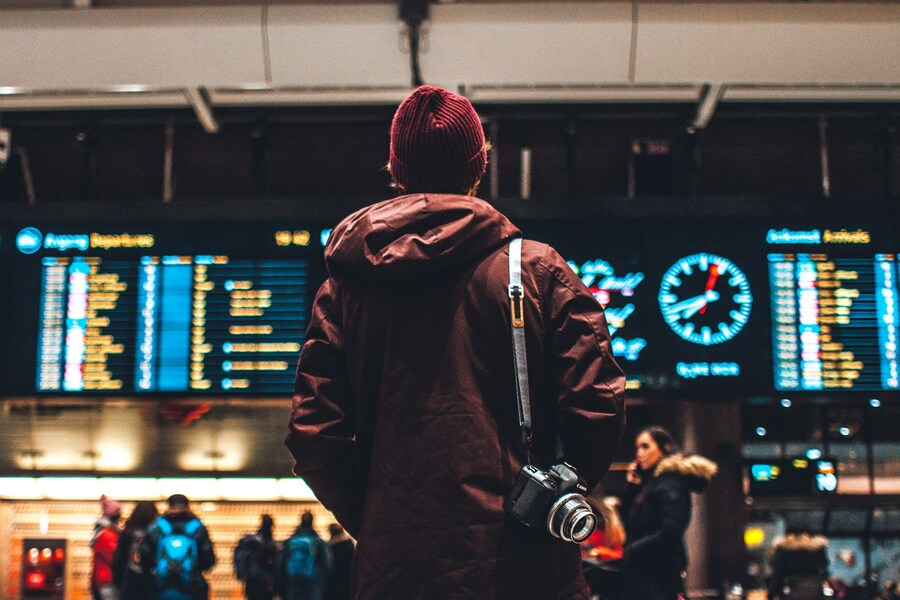With more people traveling and longer lines at the airport, as well as rising costs, you might be wondering how to make your airport experience more enjoyable. Of course, the easiest thing to do is to follow the airport rules, especially the ones set by the TSA (or other security agencies in different countries). But we all know that there's more to stress-free air travel than just following the rules. From the time you get to the ticket counter until you board your flight, here are the top 7 things to avoid doing at the airport. Let's dive in!
Airport blunders… Are you actually making these costly mistakes?

Source: Ante Hamersmit/Unsplash
1. You're unaware of the cutoff times for check-in
Airlines and airports generally recommend arriving at least 2 hours before a domestic flight's departure and 3 hours before an international flight. While this may seem like too much time at some airports, having extra time to relax is better than rushing to find your gate.
If you're running behind schedule, it's crucial to know the latest time you can arrive and still make your flight. Most airlines have minimum check-in and checked baggage cutoff times, especially for international flights, and these are listed on their websites. Delta Air Lines, for example, requires a minimum check-in time of 40 to 45 minutes for domestic flights and 1 hour for international flights. The times may vary by airport, so be sure to check the requirements carefully. Arriving later than the minimum could prevent you from checking in or dropping off your checked luggage, and you may have to pay a hefty fee to change to a later flight.
If you don't want to get to the airport too early, you can use technology to better determine when you should arrive. The MyTSA App can provide information on how crowded any US airport might be during your date and time of travel, including estimated wait times and the busiest times of day at that airport.
2. You show up too early
Arriving too early for your flight can actually be a problem, especially if you plan to check your bags. Many airports have limits on how early you can drop off your luggage. Over a dozen major airports in the United States, such as Denver, Las Vegas, and Seattle, only allow bag check-in up to 4 hours before your flight. And most American airports have a 6-hour maximum. So if you try to hand over your bags more than 4 hours before your scheduled departure, the airline staff will turn you away. You'll have to wait at the ticket counter or bag drop area until the 4-hour mark.
3. You physically check in for your flight
Avoid the long lines at the ticket counter by checking in online up to 24 hours before your flight for most airlines. This way, you'll already have your boarding pass on your phone or you can print it at home before leaving. You can then go straight to the security line at the airport, as long as you don't have any bags to check. Simply log in to the airline's website or mobile app and follow the check-in prompts.
If you're traveling with checked luggage, you'll need to take it to the luggage drop-off area near the ticket counter. Fortunately, most airports have separate lines for bag drop-off when you've already checked in online, and these lines usually move much faster than the regular ticket counter lines. This also helps keep the main ticket counters open for passengers with special requests, travel issues, and other scenarios that require an agent's assistance. Remember, online check-in typically closes 45 to 90 minutes before your flight's departure, depending on the airline.
4. You stray too far from your assigned gate

Source: Erik Odiin/Unsplash
Delays and gate changes can occur unexpectedly, so it's essential to stay close to your gate to hear important announcements about your flight. In 2023, the US Department of Transportation reported that approximately 78% of domestic flights arrived on time, indicating that nearly one-quarter of flights experienced delays due to various factors, such as maintenance, security, weather, and technological issues. Being too far from your gate may result in missing critical information about changes to your flight, leading to more complications and potentially missing your flight.
In addition, it's crucial to board your flight on time. For domestic flights, most boarding processes end 15 to 20 minutes before the scheduled departure time, and the wait is even longer for international flights. If you arrive at the gate after the doors have closed, your seat may be reassigned to a standby passenger.
To stay informed and ensure you're at your gate on time, it's recommended to monitor the departure monitors within the airport and download your airline's app. You can also opt-in for real-time text notifications about your flight, especially if you plan to wait in an airport lounge or another location further away from the gate. Other apps, such as FlightAware, offer similar services to help you stay up-to-date on your flight information.
5. You buy bottled water
It's true – airport prices can be significantly higher than what you'd find elsewhere, often 10-15% more. But there are easy ways to avoid overpaying for bottled water. Bringing your own empty water bottle and filling it up at the free drinking fountains is a great solution. You can even opt for a collapsible bottle that takes up less space in your bag. Many major US airports have Tap refillable water stations, allowing you to quickly get free filtered water. And if you're purchasing food, you can simply ask for a water cup instead of buying bottled water. With a little preparation, you can save money and stay hydrated during your travels.
6. You abandon your luggage unattended
Keeping a close eye on your luggage is crucial when traveling. Not only are you at risk of pickpocketing and theft, but leaving your bags unattended can also trigger a security alert at the airport. Travelers everywhere are encouraged to report any unattended luggage to the security team. If you step away from your carry-on while visiting a gift shop or using the restroom, another passenger or airport staff might notify the authorities. In such cases, airport officials will confiscate your bag and you may have to go through additional security screenings. If the staff can't find you to return your bag, it'll be sent to the lost and found after being deemed safe by security. The moral of the story is to always keep a close eye on your belongings while traveling.
7. You opt for on-site airport parking over off-site options
While the convenience of on-site airport parking can be tempting, especially for travelers strapped for time, it often comes at a hefty price. Booking on-site parking can cost you double or even triple the amount you'd pay for a comparable off-site parking spot. This can significantly eat into your travel budget. Fortunately, there are services like ours – ParkingNearAirports.io – that can help you find affordable off-site parking options near major airports across the United States and Canada, including cheap parking near Calgary Airport, affordable Denver Airport valet parking, and more. These off-site lots are typically secure and well-maintained, and they provide shuttle services to and from the airport terminals at regular intervals. By booking your parking spot through our platform, you can save a significant amount of money on your airport parking fees, leaving you with more to spend on your trip itself.
Here are just a few reasons why choosing off-site parking over on-site parking is the smarter decision:
- Significantly lower rates. Off-site parking providers typically offer rates that are substantially lower than those charged by on-site airport parking facilities.
- More flexible options. You'll have a wider variety of parking options to choose from with off-site providers, including covered parking, valet parking, and long-term parking.
- Convenient shuttle services. Most off-site parking lots provide complimentary shuttle services to and from the airport, ensuring a smooth and stress-free travel experience.






